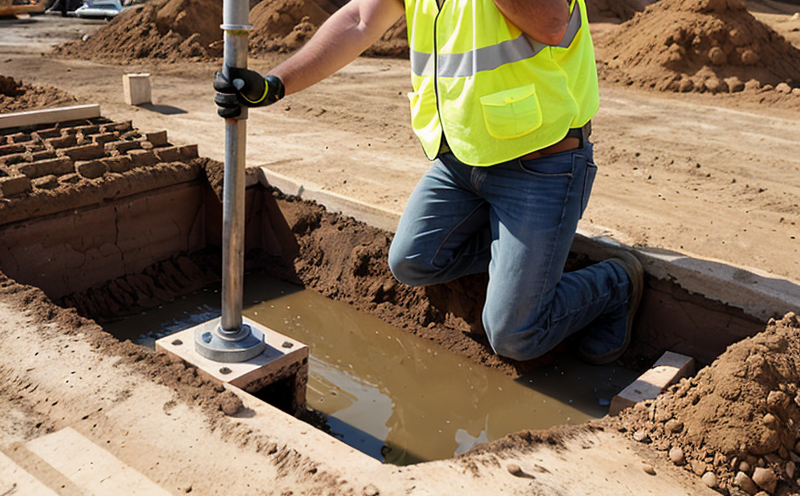ASTM D7383 Dynamic Pile Test
The ASTM D7383 dynamic pile test is a critical component of geotechnical and foundation testing. It plays a pivotal role in evaluating the performance, load-bearing capacity, and integrity of driven piles used in building and infrastructure projects. Driven piles are widely employed to stabilize soil conditions, provide load transfer paths, or resist lateral earth pressures.
This test is particularly important for ensuring that the piles meet the design criteria and can withstand the expected loads over time. The dynamic pile test measures the resistance of a pile to movement under a series of impacts, providing insight into its structural integrity and capacity. This data is essential for determining the adequacy of foundation designs and optimizing construction practices.
The ASTM D7383 test involves driving a pile into the ground until it reaches a predetermined depth or load. A specialized hammer strikes the pile at regular intervals, and sensors measure the deflection and energy absorption during each impact. The test can be conducted on various types of piles, including concrete, steel, and timber.
The results from this test are used to validate the design assumptions and predict the performance of the foundation under service loads. It is a key method for assessing pile integrity before they are loaded in-service and for ensuring that the piles meet specified quality standards.
For instance, in construction projects involving high-rise buildings or large structures with significant weight-bearing requirements, the dynamic pile test ensures that the chosen piles can handle the expected loads without failure. This helps to mitigate risks associated with soil instability or inadequate foundation support.
The ASTM D7383 test is not only a compliance requirement but also an essential tool for quality assurance and risk management in construction projects. It provides valuable insights into pile performance, which can inform design improvements and construction practices. By adhering to this standard, constructors ensure that their foundations are robust and reliable.
The test setup involves specific equipment and procedures designed to accurately measure the dynamic response of the pile. This includes high-precision sensors for measuring deflection, strain gauges for monitoring stress, and data acquisition systems for recording all relevant parameters.
- International Acceptance and Recognition
- ASTM D7383 is widely recognized in North America, Europe, and other regions where geotechnical engineering standards are adopted. It aligns with the requirements of several international organizations including:
- European Committee for Standardization (CEN)
- Institute of Electrical and Electronics Engineers (IEEE)
- International Organization for Standardization (ISO)
The test is also recognized by regulatory bodies such as the American Society of Civil Engineers (ASCE) and the Canadian Standards Association (CSA). Its widespread acceptance ensures that results from ASTM D7383 tests are valid across different jurisdictions.
Quality and Reliability Assurance
The ASTM D7383 dynamic pile test is integral to ensuring high-quality construction practices. Quality assurance in this context involves verifying that the piles meet specified standards and perform as expected under real-world conditions. This includes not only meeting design criteria but also demonstrating resilience against environmental factors such as soil variability, groundwater levels, and load variations.
The reliability of the test results is crucial for maintaining confidence in construction projects. By adhering to ASTM D7383, constructors can ensure that their foundations are robust and capable of supporting the intended loads over time. This is particularly important in regions with complex geology or where soil conditions may vary significantly.
The test setup involves several key components designed to accurately measure the dynamic response of the pile:
- Sensors: High-precision sensors are used to monitor deflection and strain during the test. These instruments provide real-time data on how the pile responds to each impact, allowing for detailed analysis.
- Data Acquisition Systems: Advanced systems collect and store all relevant parameters, ensuring that comprehensive records are available for review and analysis.
- Environmental Controls: The test is conducted under controlled conditions to minimize external factors that could influence the results. This includes monitoring soil moisture content, temperature, and other environmental variables.
The data collected during the ASTM D7383 test provides a comprehensive picture of pile performance. By analyzing this information, constructors can identify any discrepancies between design assumptions and actual performance. This allows for timely adjustments to ensure that the foundation is robust and reliable.
Reliability assurance extends beyond individual tests to include ongoing quality control measures throughout the construction process. This ensures that all piles meet the required standards and perform consistently across different sites and conditions.





